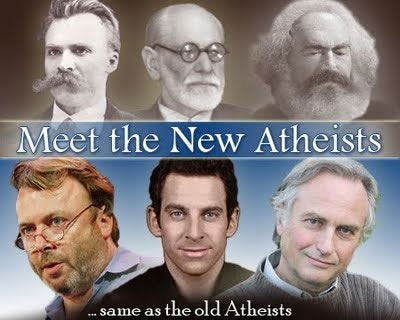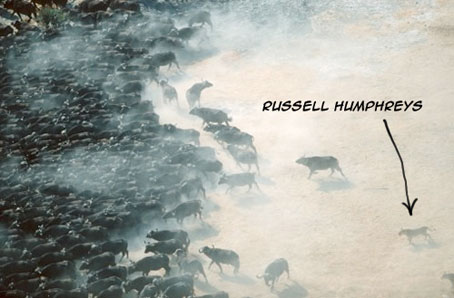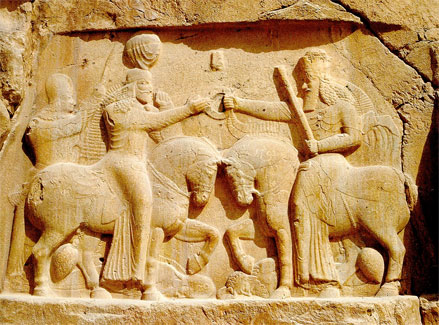May
8
2010

Last night I watched a 2007 debate between Richard Dawkins and John Lennox on 5 of Dawkins’ theses from his book The God Delusion. Lennox (who recently visited Australia to speak at the Easter Convention here in Katoomba) was delightful and made some strong statements. Dawkins was, to me, surprisingly earnest. But I did see in Dawkins’ responses to Lennox support for the observations of David Bently Hart that I read in a recent post by Justin Taylor. The new atheists are not the same as the old atheists:
Continue reading
2 comments | tags: Atheism, Christopher Hitchens, Nietzsche, Richard Dawkins | posted in Apologetics, Quotes
May
5
2010
Now no chastening for the present seemeth to be joyous, but grievous: nevertheless afterward it yieldeth the peaceable fruit of righteousness unto them which are exercised thereby. (Hebrews 12:11)
It becomes apparent that every one of God’s curses in the Bible sooner or later turns out to be a blessing. Every judgment has one eye on the present, which is usually grievous, and another eye on the future. Every discipline is a pruning to bring greater fruit. You just want to make sure you are one of the good figs, not a bad one. God’s justice is always visionary.

“There’s no such thing as a dead-end job. There are only dead-end people.”
—Zig Ziglar
Work seems like a curse, but even before the Fall there was work. After the Fall, work was a curse-cloud with a silver lining. Imagine a world where people didn’t have to work? Imagine what all those idle hands would get up to? There are places in the world where this is the case; depressed places where nothing ever changes, nothing improves; where people look at our western rat race with envy.
By faith, we understand that all employment is part of the glorification of the world.
Many Christians view work as something holding them back from ministry. This is not only incorrect, but a terribly gnostic way of viewing the world. Our work is actually not only central, but something extremely important to God. I read this old article I posted in Be Still years ago, adapted from a book by Dallas Willard. I have one of the best jobs in the world and I still grumble, so I really needed to hear this again. Here’s an excerpt:
Continue reading
Comments Off | tags: Biblical worldview, Faith, Postmillennialism | posted in Christian Life, Quotes
Apr
26
2010

[I find this one very hard to post. It gets a bit too close to the bone for me. But there is something here for all of us.]
“Be sure we are willing to accept anything
into our lives as from the Lord,
except those things which can really alter us.”
From The Inward Journey, by Gene Edwards. [1]
Chris,
I’ll give you a riddle and if you can answer the question for me fully let me know. I have been ministering the Lord for three decades now. It has been a ministry within the walls of church life and a ministry which I hope—and believe—has been centred in the Lord Jesus Christ. But here is my mystery: There are some Christians who have come among us who are greatly flawed: they come, listen to the messages, take notes and never miss a meeting; they arrive at every 6 a.m. prayer meeting, read all the good books, do everything exactly as recommended for those who are young in Christ; they pray, sing, testify, wait patiently before the Lord, do everything that Scripture itself admonishes them to do. Yet, they do not change. Why is this? I do not know. But I have noticed something. On a few occasions, I have seen such deeply flawed brothers and sisters, after many years of going on unchanged, and sometimes getting away with near murder, I might add, confronted at last.
Continue reading
Comments Off | tags: Gene Edwards | posted in Christian Life, Quotes
Apr
25
2010
 Great stuff from Peter Leithart’s blog:
Great stuff from Peter Leithart’s blog:
Michael Stead (The Intertextuality of Zechariah 1-8 (Library of Hebrew Bible/Old Testament Studies)) points to a number of intertexual connections between Ezekiel 1-11 and the vision of Zechariah 5:5-11. He concludes that the vision of Zechariah is an inversion of the Ezekiel’s vision of Yahweh’s departing glory: “Ezekiel 1-11 describes the departure of Yahweh from Jerusalem because of the idolatry (Ezek 8), iniquity (Ezek 4) and wickedness (Ezek 5) of his people, and his departure is attended by winged creatures riding on the wind. But, now that Yahweh is returning to dwell in Jerusalem, idolatry/iniquity/wickedness is being forced to depart, in a parody of Yahweh’s earlier departure.”
Continue reading
1 comment | tags: Ark of the Covenant, Ezekiel, Peter Leithart, Resurrection, Zechariah | posted in Biblical Theology, Quotes, The Restoration Era
Apr
23
2010
 “…practical, daily piety (“religious sense”) flows from liturgical piety. The sense of how man approaches God in formal public worship before His throne determines the sense of how man serves God in daily life. It follows from this that changes in practical piety are largely a reflection of changes in liturgical piety. At the same time, as we shall see, misunderstandings of practical piety feed back into liturgical piety. A practical piety that focuses on negation of the world rather than on its transformation will work to destroy the spirit of thanksgiving in the liturgy, and will also give rise to wrong understandings of what is happening during the Lord’s Supper.”
“…practical, daily piety (“religious sense”) flows from liturgical piety. The sense of how man approaches God in formal public worship before His throne determines the sense of how man serves God in daily life. It follows from this that changes in practical piety are largely a reflection of changes in liturgical piety. At the same time, as we shall see, misunderstandings of practical piety feed back into liturgical piety. A practical piety that focuses on negation of the world rather than on its transformation will work to destroy the spirit of thanksgiving in the liturgy, and will also give rise to wrong understandings of what is happening during the Lord’s Supper.”
James B. Jordan, Christian Piety: Deformed and Reformed.
Comments Off | tags: James Jordan, Liturgy | posted in Christian Life, Quotes
Apr
22
2010

“Human beings are animals whose preference for group membership is simultaneously the source of their greatest salvation and their ultimate destruction” —Xenocrates
Who has the majority of evidence to support their paradigm? Is it the Young Earth Creationists or the (mostly atheistic) Evolutionists? (Please note that as far as I am concerned, anyone else is just sitting on a very sharp fence trying to hide the pain with clever words.)
The Old Earthers, whatever their stripe (from Richard Dawkins and Christopher Hitchens to certain young Sydney Anglicans I admire and the misguided mob at BioLogos), despite their bluff, rely on hearsay and circular reasoning. Creationist cosmologist Russell Humphreys writes:
Continue reading
7 comments | tags: Christopher Hitchens, Evolution, John Dickson, Michael Jensen, Richard Dawkins, Russell Humphreys, Theistic Evolution | posted in Creation, Quotes
Apr
19
2010

Ralph Smith helpfully applies the five point Covenant model to the history of Israel between the captivity and Christ:
1) Transcendence: God’s sovereign control over the nations was revealed in this period of the old covenant more than any other. Daniel foresaw the whole history of the world from the time of Babylon to the time of establishment of the kingdom of the Messiah (Dan. 2:27ff.; 7:1ff.). Clearly the kingdoms of this world were in His hand and He was guiding history where He willed. For the Jews as a nation, this greater revelation of God’s Kingship was important for they would be apparently in the hands of unbelieving rulers through much of this period, but the fact that God had predicted the history of the entire era from the beginning put all of this in a different light. The Jews learned anew that “The king’s heart is in the hand of the LORD, as the rivers of water: He turneth it whithersoever He will” (Prv. 21:1).
Continue reading
Comments Off | tags: Covenant Theology, Paul, Ralph Smith | posted in Biblical Theology, Quotes, The Restoration Era
Apr
16
2010

“Do not forgive them, Father. They know exactly what they are doing.”
THIS POST HAS BEEN REMIXED AND INCLUDED IN GOD’S KITCHEN: THEOLOGY YOU CAN EAT AND DRINK
You must be logged in to see the rest of this post.
Join now for a year for $15!
Throughout the Bible there are two doors, or more correctly, a door and a window.
Both of them involve blood. The first takes us out of the world. The second puts us in government. The first is the Passover door, the second is a window in Jericho. One mirrors the other chiastically in the journey from slavery to Sabbath.
Continue reading
Comments Off | tags: AD70, Atonement, Feasts, Halden Doerge, Passover, Pentecost, Tabernacle | posted in Biblical Theology, Quotes, The Last Days
Apr
14
2010

The content of this post has been revised and included in Bible Matrix II: The Covenant Key.
Comments Off | tags: Peter Leithart, Temple | posted in Biblical Theology, Quotes
Apr
10
2010
or The Church with the Big Head

Human talent amazes me. Totally aside from the child prodigies, we are an extremely gifted bunch. After only a couple of decades on the planet, from those who have the opportunity to apply themselves with enthusiasm to their particular area of interest, we see some incredible achievements. For the godless, this should certainly seem miraculous. But for our dark hearts it just proves how smart and wonderful we already are in ourselves. This is the ingratitude Paul speaks of.
For Christians, talent (or beauty or wealth) is just another dead giveaway of God’s existence. And God Himself almost seems to despise this early glory as a short-lived covering of wildflowers that appears suddenly after some long-awaited rain. This is the glory of youth and it is insufferably vain. It exalts itself by calling its competition dumb and ugly.
Continue reading
Comments Off | tags: Barth, Jeff Meyers, Obama, Postmillennialism, Reformation, Roman Catholicism | posted in Biblical Theology, Christian Life, Creation, Quotes



































